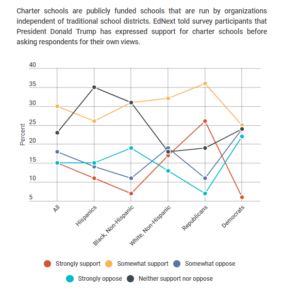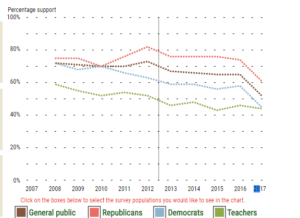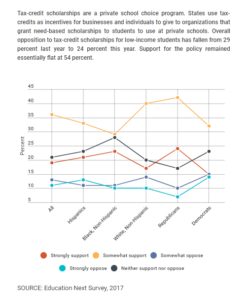The latest poll numbers are in and they don’t bode well for public education. Support for charter public schools, while still predominantly favorable, eroded, while net support for vouchers grew in the latest Education Next poll. Concerted attacks on charters have been moderately successful, and in some cases the charter sector itself has been its own worst enemy. But it will be a bitter dessert for the teachers’ unions and their allies if the singular fight against charters leads to a voucher system. And that is where the numbers are pointing.
It is kind of the Game of Thrones for public education; while the district and charter houses of public education feud, a larger menace grows beyond the wall.
But let’s look at the survey results.
Support for charter schools has fallen 12 percent from last year, the largest change in opinion that EdNext saw on any single policy from last year. The steepest drop-off came from white participants. At the same time, the survey found that opposition toward school vouchers and other similar policies that direct public aid toward private schools has softened.
Let’s start with a look at the poll, while majorities of the public and particularly Black and Brown families still supported charters more than they didn’t, there was a real dip across the board. Ed Week pulled together some of the data, here’s the latest poll
And you can see the longer term trendlines from Education Next,
They summed up the findings and methodology,
In the new nationally representative survey of more than 4,200 respondents, only 39 percent said they supported charter schools, down from 51 percent in 2016. However, that’s still more than the percentage of respondents who oppose charters, 36 percent. A quarter of respondents said they had no opinion of charter schools one way or the other.
The drop spans both major political parties. Support among Republican respondents fell 13 percent compared to 11 percent in Democrats.
But those numbers change based on how the question was asked. Respondents were divided into two groups. One was informed that Trump favors charter schools. Within that group, support among Republicans significantly increased, and only slightly eroded among Democratic respondents. This has the net effect of boosting support for charter schools to 45 percent.
In my view this is the result of a somewhat successful anti-charter campaign, failures of charters to clean their own houses, having some pretty nasty friends, whether we want them or not, as well as charters being lumped in with the rest of the “failing public schools” by some republicans. But in the end, proponents of public education should be worried. If charters wane as a reform, vouchers are waiting in the wings. And surprisingly the trend lines on vouchers are going the other way, with decreasing resistance and a stable level of majority support.
Again from EdWeek,
Opposition to tax-credit scholarships for low-income students has fallen from 29 percent last year to 24 percent this year. Support for the policy—which is most popular among the various types of private-school choice programs according to the poll—remained essentially flat at 54 percent.
The same trend was seen on the question of allowing all families to use vouchers: Opposition fell while support went unchanged.
If critics of charters worry about transparency and equity, they should be doubly worried about vouchers. And if they are playing a long game, I would hope they pay attention. They may win some rhetorical battles and sacrifice some charters on the battlefield, but they don’t even seem to notice the White Walkers on the horizon, and the war they should fight, but are steadily losing.




